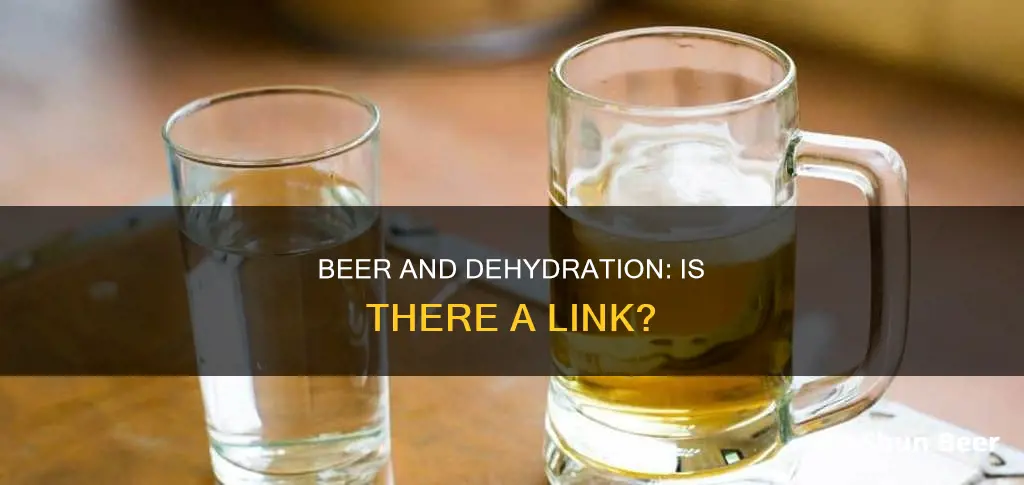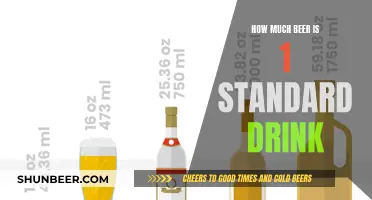
Beer is a popular alcoholic beverage that has been enjoyed for centuries. While it may not be the sole cause of dehydration, drinking too much beer can increase the risk of dehydration. This is because beer is a diuretic, which means it causes you to urinate more than you usually would. As a result, you may lose more fluids than you take in, leading to dehydration. To stay hydrated while drinking beer, it is recommended to have a glass of water with every beer and to drink in moderation.
| Characteristics | Values |
|---|---|
| Can drinking too much beer cause dehydration? | Yes, but only if consumed in large quantities. |
| Why does beer cause dehydration? | Beer is a diuretic, which causes you to urinate more frequently, leading to a loss of fluids and affecting your fluid balance. |
| How to counteract beer-induced dehydration? | Drink water while drinking beer, drink beer slowly, eat plenty of food before drinking, and limit the amount of beer consumed. |
What You'll Learn

Beer is a diuretic, increasing urine output
Beer is a diuretic, which means it increases urine output. When you drink beer, or any other alcoholic beverage, your body produces less vasopressin, a hormone that helps the body retain fluids by reducing the amount of urine the kidneys produce. With less vasopressin, your body finds it harder to retain fluids, leading to increased urination.
This diuretic effect of beer is a key reason why drinking too much can cause dehydration. The more you drink, the more your body's fluid balance is disrupted, as you lose more fluid than you take in. This fluid deficit is the hallmark of dehydration.
It's important to note that while beer increases urine output, the effect is most pronounced after the first drink. Subsequent drinks do not cause a significant increase in urine output compared to if you were drinking water. However, as beer contains alcohol, which is processed by the body at a rate of about one drink per hour, drinking too much in a short period can still lead to dehydration.
To put it simply, when you drink beer, you pee more. If you drink several beers in quick succession, your body may struggle to keep up, and you can become dehydrated. This is why it's generally recommended to have a glass of water with each beer you consume and to drink plenty of water before and after a night of drinking to maintain proper hydration and reduce the risk of dehydration.
Viagra and Beer: A Safe Combination?
You may want to see also

Alcohol suppresses the release of the antidiuretic hormone vasopressin
Vasopressin causes the body to retain water, limiting urine production. By inhibiting the release of vasopressin, alcohol increases urine output. This diuretic effect is further exacerbated by the rise in plasma osmolality caused by alcohol consumption.
However, the diuretic action of alcohol is blunted when the body is hypohydrated. In a study by Hobson and Maughan, participants in a hypohydrated state excreted less urine after consuming alcohol than when they were euhydrated. This suggests that the body attempts to restore fluid balance when dehydrated by suppressing the diuretic effects of alcohol.
The extent of the diuresis experienced due to alcohol consumption is influenced by various factors, including the amount of alcohol consumed, the concentration of alcohol in the beverage, and the individual's hydration status.
Hard Liquor After Beer: Is It Safe?
You may want to see also

Drinking on an empty stomach increases dehydration risk
Drinking beer or any alcoholic beverage can cause dehydration. Alcohol is a diuretic, which causes the body to remove fluids from the blood through the renal system, which includes the kidneys, ureters, and bladder, at a much quicker rate than other liquids.
Drinking on an empty stomach increases the risk of dehydration. This is because the stomach and intestines are not busy digesting and absorbing food matter, allowing alcohol to be absorbed into the bloodstream more quickly. With no food in the stomach to slow down the process, the body absorbs alcohol faster than it can break it down, leading to sudden spikes in blood alcohol concentration. This can cause an increased risk of alcohol poisoning, which can be fatal.
When alcohol reaches the stomach, the stomach lining swiftly absorbs approximately 20%, while the remaining 75 to 85% goes through the small intestine and is then absorbed into the bloodstream. Food in the stomach slows down the process of alcohol absorption. Carbohydrates, in particular, can significantly slow down alcohol absorption. When you consume carbohydrates while drinking, your blood alcohol concentration doesn't increase as quickly and may not even reach a quarter of what it would on an empty stomach.
Drinking on an empty stomach can also lead to faster intoxication and unpleasant and toxic side effects. These can include gastritis and other stomach problems, loss of coordination, reduced responsiveness, uncontrolled eye movements, inability to speak coherently, and rapid heartbeat.
To reduce the risk of dehydration when drinking beer or other alcoholic beverages, it is recommended to have a glass of water with every alcoholic drink and to eat food before and during drinking.
Longmire's Beer Choice: What Brand Does He Prefer?
You may want to see also

Dark drinks, like beer, contain congeners, which dehydrate you more
Alcoholic drinks like beer are diuretics, which means they cause your body to remove fluids from your blood through your renal system, including the kidneys, ureters, and bladder. This causes you to urinate more than usual, increasing the risk of dehydration.
Drinking beer can cause dehydration, especially if consumed in large amounts. However, contrary to popular belief, alcohol does not necessarily cause dehydration. Research shows that drinking an initial amount of alcohol will cause more urine output than drinking the same amount of water, but continuing to drink alcohol after that will not cause any more urine output than continuing to drink water. So, when spending a night drinking alcohol, you will only urinate just one extra time compared to if you were drinking water.
To avoid dehydration when drinking beer or other alcoholic beverages, it is recommended to drink plenty of water, eat food before drinking, limit alcohol intake, and choose drinks with lower alcohol content.
Beer During Lunch: Is It Okay?
You may want to see also

Drinking water with beer may help prevent dehydration
Beer is a diuretic, which means that it causes you to urinate more frequently. This can lead to dehydration, as your body loses fluids more quickly than it can replace them. However, drinking water with beer may help prevent dehydration.
When you drink alcohol, your body produces less vasopressin, a hormone that helps the body retain fluids. This makes it harder for your body to hold on to water, leading to increased urination. Drinking water can help replace the fluids lost through urination and prevent dehydration.
It is recommended to have at least one glass of water for every beer you drink. This can help slow down the absorption of alcohol into your bloodstream and give your kidneys time to process and filter the alcohol out of your system.
In addition to drinking water, there are a few other things you can do to prevent dehydration when drinking beer:
- Eat plenty of food before drinking, especially carbohydrates.
- Limit the amount of beer you drink and pace yourself.
- Choose lower-alcohol or "light" coloured drinks.
- Drink water before and after your night out.
By following these tips and staying hydrated, you can help prevent dehydration and reduce the risk of a hangover or other ill effects from drinking too much beer.
California Beach Beer Drinking: What's Allowed?
You may want to see also
Frequently asked questions
Yes, drinking beer can cause dehydration. Beer is a diuretic, which means it causes you to urinate more than you usually would. This can increase the risk of dehydration as you lose fluids.
Beer contains alcohol, which is a diuretic. This means it causes the body to remove fluids from the blood through the renal system at a much quicker rate than other liquids.
Dehydration can cause a wide range of symptoms, including:
- Dark-coloured urine and thirst
- Headaches
- Fatigue
- Nausea and vomiting
- Dizziness
- Weakness
To prevent dehydration when drinking beer, it is recommended to:
- Drink water along with beer.
- Eat plenty of food before drinking, especially carbohydrates.
- Limit the amount of beer consumed.
- Choose beers with lower alcohol content.







